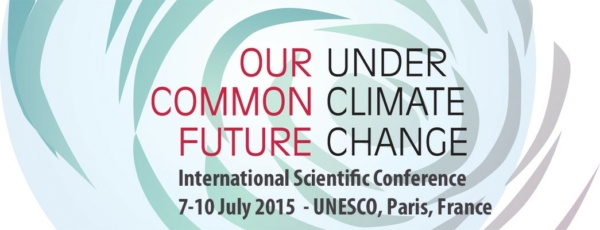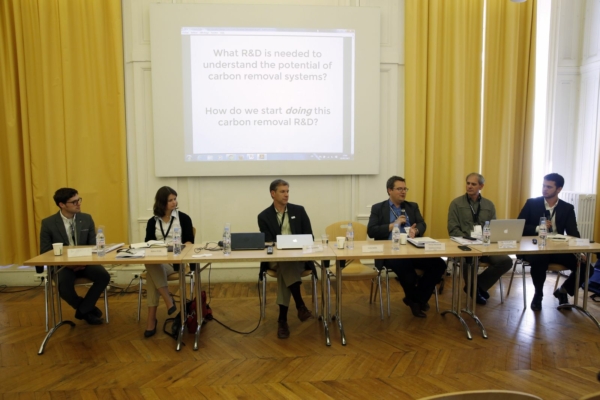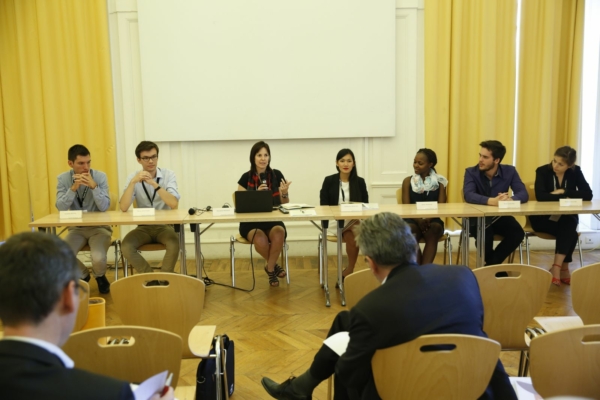
Image credit: © Our Common Future under Climate Change
Side event: New frontiers for integrated assessment of climate change and policies
July 8th 2015– 5:30pm-7:45pm – UPMC – 4 place Jussieu, Paris
Organizers: CIRED, with the support of the Chaire MPDD and IIASA
Amongst the major planetary challenges of the 21st century are the interplays between climate change and the multiple dimensions of development. The specific challenge for the modeling community is to help understanding these interplays and putting some rationale in policy debates about how to simultaneously address climate change and the other “stresses” or “tensions” that might affect the sustainability of growth over the following years and of development pathways over the long run. This side-event will organize an open discussion between the key teams involved for years in IAM about how to meet this challenge. The existing tools result from long standing traditions often launched as soon as in the seventies after the first oil shock and in the context of controversies about nuclear energy. Much progress has been made since then, including thanks to greater computational power but it is time, just after the 5th IPCC report and before the COP21 which will open a new area for climate policies to discuss whether the new challenges can be addressed through a better and more extensive use of the current state-of-the-art (an improvement of the science/policy interface) or demand profound evolutions of the paradigms behind this state-of-the-art. Examples of these scientific challenges are:
- Bridging the gap between the analysis of the launching phases of climate action in adverse economic conditions and the analysis of long-term transformation pathways.
- Representing bifurcations in development pathways, with or without climate policies, which means to capture the lock-in effects of short-term behaviors
- Coupling energy models with models of urban and of land-use dynamics in a general equilibrium framework which represents the interplays between income distribution, ‘non marketed/informal’ activities, the content of technical change and growth,
- Capturing the dependence of the magnitude of the climate change impacts upon the structural fragilities and adaptive capacity of the impacted society,
The side-event will be based on a Call for contributions to researchers of the IAM community present at the Our Common Future conference. They will be asked to synthetize in a few bullet points their views of the New Frontiers for the IAM given their own vision of the scientific and policy challenges ahead about these three questions:
- What are the research questions on the interactions between climate policies and sustainable development you would want the models to address?
- What are the theoretical and methodological obstacles to overcome so that the models are able to address those questions?
- What are the major institutional or organizational barriers, internal or external to our community, to be lifted to alleviate these obstacles?
The side-event will last 2 hours and 15 minutes and will be organized as follows:
One introductory keynote (20 minutes) by N. Nakicenovic and JC Hourcade, synthesizing the received material and the lessons from the two parallel sessions.
A roundtable of reactions to this keynote by representatives of the various modeling approaches (5 minutes each, participants tbc): Ottmar Edenhofer, Riahi Keywann, Detlef Van Vuuren, John Reilly, Maryse Labriet, Pryadarshi Shukla, Emilio La Rovere, Leon Clarke, Arnulf Grübler, Steve Pye.
One hour of overall debate with the audience covering three main issues: the main scientific challenges, the methodological breakthrough to be operated, the institutional challenges for a better organization of the scientific community.

Side event : Innovations in Decarbonization
A joint UC Berkeley/MINES ParisTech event exploring the pathways and actions needed to prevent climate change
July 10th 2015 – 9:00 am-5:00pm – MINES ParisTech, 60 Boulevard Saint Michel, 75006 Paris, Rooms V115-V119
Organized by Nadia MAÏZI (CMA/MINES ParisTech and Chair MPDD) and Paul WRIGHT (BECI/UC Berkeley)
Over the last 20 years, successive COPs have highlighted the need for urgent action in reducing greenhouse gas emissions to avoid the global mean temperature exceeding a 2ºC increase. In the meantime, agreements discussed in the course of negotiations are extremely complex, mainly focused on legal terms. Discussions about the kind of decisions to implement, which rely on scientific contribution, seem to be on the back burner. Several reasons explain this: the climate change timeframe is much longer than a political mandate and does not put across the urgency of the situation. Implementing long-term strategies relevant to climate issues is often difficult and the measures unpopular. For example, in France transport sector lobbies recently put up barriers to stop a new pollution tax. Moreover, the decisions taken need to shake up a very inert system. To deal with climate urgency, new planning paths must be accepted. For all of these reasons, the discussion process at climate negotiations is extremely slow and a range of approaches and measures at different levels should be envisaged. This was the framework for the research conducted by the 2014 class of the Master of Advanced Studies ‘Energy System Optimization’, whose 8 proposals address climate change issues from a different perspective: they suggest that tackling the challenge at regional, sectorial, and individual levels can bring relevant and quicker results. Even if they come across as fanciful policies or overly naive, we hope that these ideas will enlighten negotiators and extend policy choices in an interesting way.
Scientists increasingly agree that carbon removal solutions — i.e. those systems and process capable of net-negative carbon emissions — are critical for fighting climate change. At the same time, many carbon removal solutions are less developed technically and scientifically than other GHG mitigation technologies such as renewable energy and energy efficiency. This panel discussion explores the state of carbon removal research and development, the key questions surrounding various carbon removal approaches, and the development activities needed to answer key technical and scientific questions. The panel will discuss options for coordinating carbon removal research efforts across the international community, as well as options for engaging governments, industry, and NGOs in funding and executing carbon removal research and development activities. After a moderated panel discussion, questions from the audience and interested participants across the globe will be addressed
Given the complex international situation, strategies to tackle energy-related issues need effective normative tools to deal with the different types of constraint (e.g. climate-related, financial, legal, political, technical). Various scenarios are now available to provide an insight into the challenges of energy transition under environmental constraint. However, the regional, technological and social conditions that trigger this transition require developing tools to identify the policy mixes needed for new directions in technical systems and modes of development.In particular, the aim is to reconcile and connect different scales (temporal,spatial, social) in order to understand:
– The political implications that necessarily take place at several levels, from global to local,
– The impact of phenomena with different dynamics (several decades versus seconds), and
– The central role of people (for whom the future must be acceptable and desirable, i.e. compatible with aspirations and behavior).
This multi-scale integration brings up significant methodological obstacles that we propose to examine in three sessions. During the events, international scientists involved in the strategy of major groups and academic organizations will present the reconciliation of long-term approaches employed in prospective exercises at different scales:
– Short-term/long-term temporal scales : Reconciliation involves examining the “inertia” of systems, e.g.urbanization or the composition of current mixes, versus the “instantaneousness” of usage (e.g. mobility using electric vehicles or smart grid solutions, energy efficiency) as well as the technical conditions for operating systems (i.e. network reliability, availability and stability).
– Spatial scales : Different levels of spatial issues will be tackled such as top-down versus bottom-up pledges for emerging countries, centralized versus decentralized networks, managing intermittent electricity production sources and integration into the network.
– Societal scales: This will involve discussing the assessment of different development paradigms (degrowth/growth) and the integration of behavior as relevant modeling characteristics.



COP18 : Doha (Qatar) 2012
2020-01-21T12:39:45+01:00
Image credit: © COP18 Side event : Smart, Sustainable and Low-Carbon growth of electricity systems November 27th [...]
COP17 : Durban (South Africa) 2011
2020-01-21T12:39:23+01:00
Image credit: © COP17 Side event : Long-term prospective of business contribution to low carbon development December [...]
COP15 : Copenhague (Denmark) 2009
2020-01-21T12:38:46+01:00
Image credit: © COP15 Side event: Beyond the financial crisis: Regional energy policy and global carbon [...]


